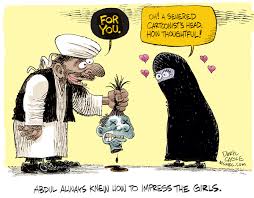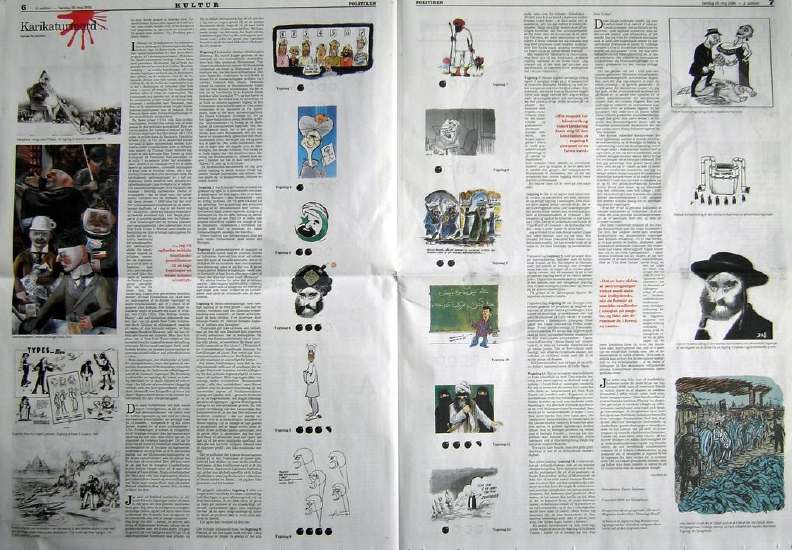 Had to do it.
Had to do it.
Posted on 01/06/2011 8:21:34 AM PST by fight_truth_decay
When one considers all of the people and places in the West targeted by transnational jihadists over the past few years, iconic targets such as New York’s Times Square, the London Metro and the Eiffel Tower come to mind. There are also certain target sets such as airlines and subways that jihadists focus on more than others. Upon careful reflection, however, it is hard to find any target set that has been more of a magnet for transnational jihadist ire over the past year than the small group of cartoonists and newspapers involved in the Mohammed cartoon controversy.
Every year STRATFOR publishes a forecast of the jihadist movement for the coming year. As we were working on that project for this year, we were struck by the number of plots in 2010 that involved the cartoon controversy — and by the number of those plots that had transnational dimensions, rather than plots that involved only local grassroots operatives....
(Excerpt) Read more at stratfor.com ...
Headley reportedly became an informant for the U.S. Drug Enforcement Administration (DEA) after being arrested and charged with smuggling heroin into the United States from Pakistan in 1997. Following 9/11, he allegedly worked for the FBI as a terrorism informant. Following his arrest Oct. 3, he is reportedly again cooperating with the U.S. government.
Daood Gilani was born in 1960 in Washington, D.C., to a Pakistani father and American mother, worked as a surveillance operative and operational planner for the Pakistan-based militant groups Lashkar-e-Taiba (LeT) and Harkat-ul-Jihad e-Islami (HUJI).
2006, Headley legally changed his name from Daood Gilani to David Coleman Headley, anglicizing his first name and taking his mother’s maiden surname.
Headley used common militant communication method of creating messages saving them in the drafts folder of a Web-mail service rather than sending the message. The person creating such a message provides a colleague with the user name and password for that Web-mail account.
According to the Oct. 11 federal complaint, Headley traveled from Chicago to Copenhagen in January 2009 to conduct surveillance of the Jyllands-Posten offices in Copenhagen and Aarhus, Denmark, and to photograph and videotape the surrounding areas. He then traveled to Pakistan, where he met with his co-conspirators to brief them on his surveillance operations and to construct a plan for the attack.
In the Dec. 7 indictment, the U.S. government alleges that in order to conduct surveillance for the Mumbai attacks, Headley made five extended trips to Mumbai: one in September 2006, two in February and September of 2007 and two in April and July of 2008.
If Headley were reporting to the FBI, it could also explain the very specific warnings that the U.S. government gave to the government of India about plans to attack hotels in Mumbai in September 2008. Following the warning, the government of India initially increased security measures at these sites, but the measures were dropped before the attacks were launched in November 2008.
During much of his surveillance activity, Headley identified himself as an employee of the immigration services company First World, but there is no evidence that Headley ever worked for that company. There is also no information in the documents released so far that would explain how Headley paid for his extensive international travel, much less earned money to cover his day-to-day expenses.
Finally, there is the issue of Headley’s alleged work as a DEA and FBI informant (which could help explain at least some of the financial mysteries discussed above). Given the demonstrated — and considerable — nexus between heroin trafficking and terrorism funding for the jihadist groups operating in Pakistan and Afghanistan, such a crossover of an informant from narcotics to terrorism is no surprise — especially following the incredible push by the U.S. government to recruit human intelligence sources with links to the jihadist world following the 9/11 attacks.
At present, it is very difficult to ascertain if Headley was a double agent who was really reporting to LeT and HUJI the entire time he was ostensibly working for the U.S. government or if he was merely a rogue informant who was playing both ends against the middle for his own personal benefit. Such rogue sources have been seen in jihadist cases before. If Headley was either a double agent or a rogue source, there may be some significant blowback for the U.S. government as further revelations are made about the case.
Headley is a U.S. citizen and changed his name in order to camouflage his heritage and religious affiliation. He conducted an inordinate amount of surveillance activity by himself. Any time a person conducts surveillance he or she is vulnerable to detection. That vulnerability is mitigated somewhat if the surveillance is conducted by a team of individuals and the team members can take turns exposing themselves to potential countersurveillance. Doing a solo surveillance operation means that the surveillance operative is forced to show his face time and again to anyone watching. Activities such as taking photographs and making video recordings are far riskier than simply observing a target. Having one single surveillance operative visit two offices of the same newspaper and then take dozens of photos and make 13 video recordings of the offices — in a one-week span, no less — is terrible surveillance tradecraft.
People who have conducted thousands upon thousands of hours of surveillance would have a hard time creating cover for action and status that would justify that much surveillance activity — especially when the surveillant is a foreigner and working alone.
The only rational explanation for why Headley was not noticed while conducting his surveillance is that nobody was looking.
Read more in detail: Tactical Implications of the Headley Case
That Stratfor article just sucks the breath right out of me. How can any sane person not see the danger we confront?
 Had to do it.
Had to do it.
ping


[oops..began]
Son of a PIG!, that’s funny.
pinged becuase I was wonderin’, so then this makes us all infidels?
Disclaimer: Opinions posted on Free Republic are those of the individual posters and do not necessarily represent the opinion of Free Republic or its management. All materials posted herein are protected by copyright law and the exemption for fair use of copyrighted works.